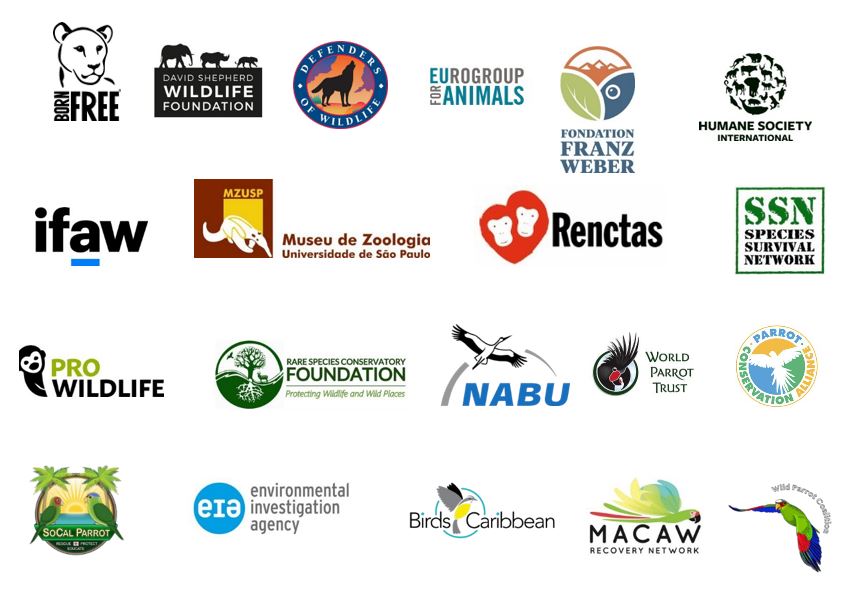
Ms. Astrid Schomaker,
Director Green Diplomacy & Multilateralism, DG Environment of the European Commission
Astrid.Schomaker@ec.europa.eu
31 October 2023
Re: Potential CITES Compliance Measures against the EU
Dear Ms. Schomaker,
As you will be aware, the Standing Committee of the Convention on International Trade in
Endangered Species of Wild Fauna and Flora (CITES) is tasked with determining, at its upcoming
meeting in November (SC77), whether the EU is complying with CITES rules, which permit trade in
Appendix I specimens only in exceptional circumstances and under particularly strict conditions. The
undersigned organizations share concerns expressed in the Secretariat’s report (SC77 Doc. 33.8) on
its verification mission to facilities breeding Appendix-I animal species in captivity in Germany and
Spain, that the EU is not effectively implementing all relevant CITES requirements. This not only has
implications for the effective implementation of CITES but has consequences for the conservation of
wild populations of highly threatened species.
Our concerns include the following:
- Commercial trade from facilities not registered with CITES
The EU trades significant numbers of captive-bred specimens of Appendix-I animals for commercial purposes (a total of 47,337 from 2011-20201) but does not implement the requirement in Resolution Conf. 12.10 (Rev. CoP15) on Registration of operations that breed Appendix-I animal species in captivity for commercial purposes to register operations breeding App. I animals for commercial purposes with the CITES Secretariat, with the exception of some facilities breeding falcons. This prevents oversight by the Secretariat and CITES Parties (including range States from which the relevant species were derived) and undermines the implementation of the Convention.
The EU claims that its internal process “in some ways goes beyond what is required under the provisions of Res. Conf. 12.10 (Rev. CoP15)” but in others its provisions are weaker than those in this CITES resolution. It appears that the EU does not trace the legality of founder stock back to the source, and does not require that breeding operations make a continuing meaningful contribution to conservation. The EU’s full implementation of provisions in Resolution Conf. 12.10 (Rev. CoP15) would ensure that all Member States are consistent in meeting its requirements, whereas at present, implementation and management vary among EU Member States. - Commercial nature of facilities and transactions involving extremely rare species purportedly for conservation purposes
The Secretariat’s assessment raises concerns that EU Member States consider transactions as noncommercial that in reality are of a primarily commercial nature.
One case of particular concern is the sale of Spix’s macaws (Cyanopsitta spixii), a species extinct in the wild, primarily as a result of illegal trade and demand from private collectors. 26 Spix’s Macaws have recently been transferred to India and a total of 50 to Belgium, Denmark and Slovakia according to the German environment ministry2 .Though the relevant German breeding facility apparently received significant amounts of money for transferring captive-bred birds to private persons and zoos, the German authorities deemed these transactions to be non-commercial, providing different explanations: One is the “establishment of a reserve population” (in a non-range State) and “conservation breeding”. A second explanation provided is that “sales would generate income for the breeding program” or link “financial operations to conservation outcomes” as the “owner” of the nonprofit facility stated to the Secretariat. In addition, a detailed plan provided by the relevant German regional CITES authority describes how “a percentage of annual offspring can be used to establish a legal market with free marketing permits” once a certain captive population has been reached (see Annex 2 of SC77 Doc. 33.8). However, this marketing plan does not appear to be consistent with the Memorandum of Understanding and Management Plan of 2018 published by Brazil3.
The development of plans for sale or lease of this species conflicts with both CITES and EU requirements. Permits are being issued for purported non-commercial breeding purposes, when the intended future use of offspring appears to be commercial trade4. Moreover this ignores the very real threat that the development of a legal market, potentially fuelling trade and demand, poses for a species of which the first individuals have only recently been reintroduced into the wild. Commercial trade in such a rare species is an extremely risky endeavor with real-world consequences. The Brazilian organization RENCTAS has warned that this move increases the risk of extinction through
trafficking5 . Already Spix’s macaws “with CITES” are being advertised for sale on private traders’ fora in India6.
The decision to commercialize trade not only threatens the success of existing conservation efforts and Brazil’s attempts to re-establish the species in the wild, but sets a dangerous precedent for the commercialization of trade in other species highly valued by collectors and threatened in the wild.
For example, Germany has also provided permits to the same breeding facility for the export of four
App. I listed Lear’s macaws (Anodorhynchus leari) to a private zoo in India7. This species is Endangered and has been threatened by a recent upsurge in illegal trade, with recent seizures in Suriname8 and Bangladesh9. 23 of the 29 birds seized in Suriname were later stolen while in custody10. While the three birds seized in Bangladesh which arrived in a consignment originating in Belgium, reportedly died in custody11, shortly afterwards Lear’s macaws were being offered for sale on-line in India12, despite the fact that no legal imports are recorded for that country13. - The role of “hobby breeders”
EU Member States apparently treat transactions of App. I species involving private or “hobby” breeders as non-commercial (using purpose code B, breeding for non-commercial purposes) even when they appear to be for primarily commercial purposes. The CITES Secretariat rightly clarifies that the “hobby” aspect should “not be a determining factor to assess the actual degree of commerciality of the transactions” and that according to Article VII of the Convention and CITES Res. 5.10 (Rev. CoP19), the term “commercial purposes” should be defined by the country of import as broadly as possible so that any transaction which is not wholly “non-commercial” will be regarded as “commercial”. The use of the weakly-defined term “hobby” or “private”, to determine the commercial nature of an operation risks setting a precedent that could undermine compliance with the Convention - Import of rare Appendix I parrots in contravention of CITES rules
In 2018 experts and conservation organizations expressed concerns that the German government may have assisted the same facility implicated in the trade in Spix’s and Lear’s macaws to gain access to wild-caught App. I specimens of other parrot species not held in captivity outside the range State14 15. In 2018, two Imperial parrots (Amazona imperialis) and 10 Red-necked parrots (Amazona
arausiaca) were imported from Dominica, while the country was under a CITES trade suspension, using export permits that were not signed by the authority registered in the directory of authorities on the CITES website. Both species are fully protected under national law and the red-necked parrots were being prepared for release to the wild. Germany claims the imports were for emergency reasons in response to a hurricane that struck Dominica five months earlier but it was known that populations of both species survived the hurricane. Conservation organizations involved in the in situ conservation of these species were not consulted and no proposal, conservation plan or agreement was shared with the team in charge of parrot conservation on the island16. Meanwhile, in 2020, the government of Dominica requested the assistance of their conservation partners for the repatriation of all the birds and of any progeny that may have been produced in Germany17. However, it appears that the birds have not been returned. - Source of founder stock
The EU does not trace the legality of founder stock back to its source. Of the 137 Spix’s macaw specimens imported into Germany from 2005 to 2021, mostly from Qatar, only 2 specimens originated legally from Brazil. For all others legal acquisition is highly questionable.
Although Germany imported 41 live specimens of Lear’s macaw, from Qatar between 2015-2018, no prior exports/imports to Qatar have been recorded, with the exception of one individual imported from Germany in 201618. This calls into question whether these specimens or related founder stock were legally acquired at source (Brazil).
By not being required to ensure that breeding stock for commercially traded specimens has been traced back to source, the EU market provides an opportunity to ‘legitimize’ illegally acquired specimens. Similar concerns have been raised regarding EU trade in reptile and amphibian species19,20. - No role for range States
Failure to implement the registration process called for in Res. 12.10 (Rev. CoP159) excludes range States from: 1) the opportunity to review the claimed production capabilities of a facility; 2) reviewing evidence that founder stock was legally acquired (particularly for species that are fully protected in range States); and 3) confirming that the facility is positioned to make a meaningful contribution to the conservation needs of the species.
In conclusion, we are concerned that the EU, by failing to fully comply with requirements agreed to by the CITES Parties, undermines the protection of species listed in Appendix I.
We urge you to adopt the CITES Secretariat’s recommendations that the EU fully implement Resolution Conf. 12.10 (Rev. CoP15), and suspend exports of captive- bred specimens of App.I species for commercial purposes from facilities that are not registered with the CITES Secretariat (including “hobby” and ”private” breeders). The existing approval and maintenance of multiple facilities for falcon species illustrates that the EU has in place adequate processes to successfully implement the registration program. It should do so for other species. We urge the EU to assess the potentially commercial nature of transactions and facilities in accordance with the definitions contained in CITES Resolution 5.10 (Rev. CoP19) and CITES Article III, paragraphs 3 (c) and 5 (c), which specify that the purpose of import of any Appendix I specimen must be non-commercial regardless of the use to which the revenues of sale might be put in the country of export. We also urge the EU to ensure that founder stock of any registered population can be traced back to a legal source. Regarding the parrots imported from Dominica, we urge the EU to agree that these were not obtained in full compliance with CITES requirements and recommend that they be returned to Dominica, as has been requested by the Environment Ministry of that country21.
Yours sincerely,
Birds Caribbean
Bornfree Foundation
David Shepherd Wildlife Foundation
Defenders of Wildlife
Eurogroup for Animals
Environmental Investigation Agency
Fondation Franz Weber
Freeland Foundation
Humane Society International
International Fund for Animal Welfare
Macaw Recovery Network
Museu de Zoologia da Universidade de São Paulo
Naturschutzbund Deutschland (NABU)
Parrot Conservation Alliance
Pro Wildlife
Rare Species Conservatory Foundation
Rede Nacional de Combate ao Tráfico de Animais Silvestres (RENCTAS)
SoCal Parrot
Species Survival Network
Wild Parrot Coalition
World Parrot Trust
cc:
Ms. Ivonne Higuero, CITES Secretary General – ivonne.higuero@un.org
Dr. Rosemarie Gnam, Chair of the CITES Standing Committee – rosemarie_gnam@fws.gov
Members of CITES Standing Committee
Ms. Floika Fink Hooijer, Director General DG Environment – Florika.Fink-Hooijer@ec.europa.eu
Mr. Jorge Rodríguez Romero, Head of Unit Global Environmental Cooperation & Multilateralism –
Jorge.RODRIGUEZ-ROMERO@ec.europa.eu
Mr. Sebastian Gil, Acting Head of Unit Global Environmental Cooperation & Multilateralism –
Sebastian.GIL@ec.europa.eu
Mr. Hugo-Maria Schally, Adviser for International Environmental Negotiations – HugoMaria.Schally@ec.europa.eu
Footnotes
to
1 https://cites.org/sites/default/files/documents/E-SC77-33-08.pdf
2 Response by Bettina Hoffmann, Secretary of State, German Federal Ministry of the Environment, to Ina Latendorf,
Member of the German Parliament as of 18 October 2023, https://dserver.bundestag.de/btd/20/089/2008955.pdf (page 91)
3 https://www.oeco.org.br/wp-content/uploads/2020/03/Doc-2-memorando-ararinha.pdf
4 https://cites.org/sites/default/files/documents/E-SC77-33-08.pdf
5 https://renctas.org.br/threat-un-to-vote-on-proposal-that-could-authorize-international-trade-in-endangered-brazilianmacaws/
6 Facebook 12th and 16th December 2022
7 https://cza.nic.in/uploads/documents/reports/hindi/AR_greenszoojam_2223.pdf
8 https://cites.org/sites/default/files/documents/E-SC77-33-01_2.pdf
9 https://cites.org/sites/default/files/documents/E-SC77-33-03_0.pdf
10https://www.amda.org.br/index.php/comunicacao/noticias/6886-das-29-araras-azuis-de-lear-resgatadas-no-surinameapenas-5-chegam-ao-brasil
11 https://cites.org/sites/default/files/documents/E-SC77-33-03_0.pdf
12 Facebook, 14 September 2023
13 UNEP-WCMC CITES Trade Database
14 https://docs.wixstatic.com/ugd/24d11c_bb8dd89432384178b9d07fcfa38f7a18.pdf
15 https://petchary.wordpress.com/2018/04/09/letter-to-the-un-environment-programme-expresses-concern-over-transfer-ofrare-dominican-parrots-to-germany/
16 https://www.birdscaribbean.org/2018/04/birdscaribbean-speaks-out-on-recent-controversial-export-of-threatened-parrotsfrom-dominica-to-germany/
17 https://www.birdscaribbean.org/wp-content/uploads/2020/10/Minister-Letter-low-res.pdf
18 CITES Trade Database
19 https://www.traffic.org/site/assets/files/12036/sri-lankan-reptiles.pdf
20 https://www.sciencedirect.com/science/article/abs/pii/S0006320716301987
21 https://www.birdscaribbean.org/2018/04/birdscaribbean-speaks-out-on-recent-controversial-export-of-threatened-parrotsfrom-dominica-to-germany/
